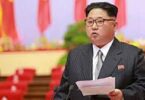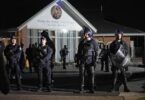WASHINGTON (Reuters): The founder of the far-right militant Oath Keepers Stewart Rhodes was sentenced to 18 years in prison on Thursday for seditious conspiracy, the longest sentence imposed to date over the Jan. 6 US Capitol riot that sought to keep Donald Trump in the White House.
US District Judge Amit Mehta delivered the sentence after a defiant Rhodes stood before him in an orange jumpsuit and claimed he was a “political prisoner” who, like Trump, was trying to oppose people “who are destroying our country.”
“For decades, Mr. Rhodes, it is clear you have wanted the democracy of this country to devolve into violence,” Mehta told him.
“I dare say, Mr. Rhodes, and I’ve never said this about anyone who I’ve sentenced: You, sir, present an ongoing threat and peril to this country, to the republic and the very fabric of our democracy.”
Rhodes, a former Army paratrooper turned Yale-educated lawyer, was convicted in November by a federal court jury in Washington.
Rhodes’ prison term represents the longest sentence for any of the 1,000-plus people charged in connection with the Jan. 6, 2021, Capitol attack by supporters of Republican then-President Trump in a failed bid to block Congress from certifying Democratic rival Joe Biden’s November 2020 election victory.
Until now, the longest sentence was 14 years in prison given to a Pennsylvania man who attacked police during the rampage.
Prosecutors had sought a sentence of 25 years for Rhodes.
“Mr. Rhodes led a conspiracy to use force and violence to intimidate and coerce members of our government into stopping the lawful transfer of power following a presidential election,” federal prosecutor Kathryn Rakoczy said. “As the court has just found – that is terrorism.”
Rhodes expressed no remorse and instead accused the far left of destroying America.
“I believe this country is incredibly divided. And this prosecution – not just of me, but of all J6ers – is making it even worse. I consider every J6er a political prisoner and all of them are being grossly overcharged,” he said.
He also vowed “to expose the criminality of this regime” from his prison cell.
In addition to seditious conspiracy – a felony charge involving attempting “to overthrow, put down or to destroy by force the government of the United States” – Rhodes was convicted of obstructing an official proceeding and tampering with documents. Rhodes was acquitted of two other charges.
Rhodes, who wears an eye patch after accidentally shooting himself in the face with his own gun, founded the Oath Keepers in 2009.
The militant group’s members include current and retired US military personnel, law enforcement officers and first responders. They have appeared, often heavily armed, at protests and political events including racial justice demonstrations that followed the 2020 murder in Minneapolis of a Black man named George Floyd by a white police officer.
Mehta also on Thursday sentenced co-defendant Kelly Meggs, a former Florida Chapter leader also convicted of seditious conspiracy, to 12 years in prison.
Prosecutors asked Mehta to sentence Meggs, the group’s former Florida chapter leader, to 21 years in prison, although Meggs’ family members urged the judge to look at the defendant’s good qualities as a protector and provider in his role as a father, brother and husband.
Meggs’ wife Connie was also separately convicted in a different trial with other associates of the Oath Keepers for their roles in the Capitol attack.
“I truly apologize for being here,” Kelly Meggs said through tears. “It has not only destroyed my life, but the life of my entire family.”
Meggs admitted that he should have never entered the Capitol grounds, but he nevertheless denied that he planned his actions in advance, and he blamed his “vile and hateful language” for leading to his conviction.
Meggs, who in addition to seditious conspiracy was also convicted of four other felonies including obstructing an official proceeding, led a group of Oath Keepers clad in paramilitary gear into the Capitol on Jan. 6.
Others, meanwhile, staged a “quick reaction force” at a hotel in nearby Arlington, Va., that prosecutors said was equipped with firearms that could be quickly transported into Washington.
Although attorneys for Rhodes vowed to appeal the conviction, they told reporters outside the courthouse that they were pleasantly surprised that Mehta did not impose a stricter sentence.
France says Iran ballistic test worrying in light of nuclear escalation
PARIS (Reuters): France on Thursday accused Iran of violating a U.N. Security Council resolution endorsing the 2015 nuclear deal after it carried out a long-range ballistic missile test, which Paris said was worrying given “uninterrupted escalation” of Tehran’s nuclear programme.
Iran successfully test-launched a ballistic missile with a potential 2,000-km range on Thursday, state media said, the latest in ballistic missile tests and satellite launches.
“These activities are all the more worrying in the context of the continuing escalation of Iran’s nuclear programme”, French foreign ministry spokesperson Anne-Claire Legendre told reporters at a daily briefing.
U.N. Security Council resolution 2231 calls on Iran not to conduct “any activity” related to ballistic missiles capable of delivering nuclear weapons, but the language is ambiguous, leaving it open to interpretation.
Western officials say that although the launches go against 2231, they are not a violation of the core nuclear agreement between Iran, Britain, China, France, Germany, Russia and the United States.
Western powers are particularly concerned because U.N. Security Council restrictions on missiles and related technologies last until October 2023 after which Iran is free to pursue its ballistic missile activity.
Legendre’s reference to the escalation of Iran’s nuclear programme comes just 10 days before the International Atomic Energy Agency’s 35-nation Board of Governors meets in Vienna.
“Iran’s activities pose serious and increased non-proliferation risks without any credible civilian justification,” she said.
Ahead of March’s board meeting, the IAEA and Iran said they had agreed to make progress on various issues, including a long-stalled IAEA inquiry into uranium particles found at three undeclared sites in Iran.
They also agreed to re-install all extra monitoring equipment, such as surveillance cameras, at nuclear sites that was put in place under Iran’s 2015 nuclear deal with major powers, but then removed last year as the deal unravelled following the U.S. withdrawal in 2018.
Iran denies seeking nuclear weapons.
It is unclear how much progress there has been and whether Western powers will decide to push for a resolution ordering Iran to cooperate more.
“We expect Iran to respect its international obligations … and carry out concrete and tangible progress before the Board of Governors meeting,” Legendre said.







